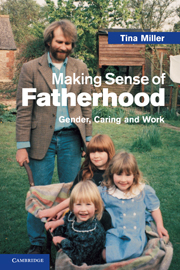1 - Gendered lives and caring responsibilities
An overview
Published online by Cambridge University Press: 01 March 2011
Summary
I think in terms of the kind of era thing, I think, yeah, it's almost more acceptable now to be, you know, a man, a male, showing your emotions.
(Mike)This book explores the journeys of a group of men into first-time fatherhood in the UK. It does so at a time when discussions about men and their involvement in family lives – or lack of involvement – continue to occupy political debate, newspaper column inches and of course individual and family lives too. Whilst so much around women's lives and motherhood is simplistically assumed, taken for granted and unquestioned, the relationship between men and fatherhood is seen as more problematic: requiring definition, ‘claims’ and other interventions in order to shape its visibility (or deny it), its dimensions and direction. The parameters of fatherhood are, then, less clearly drawn when set beside those which powerfully and morally encompass motherhood. But both are shaped by the ‘choices’ and constraints in which gendered lives are lived and which converge on the domains of the home and paid work. These domains provide the settings in which many of the responsibilities associated with motherhood and fatherhood – caring and providing – have been understood and practised. Yet these responsibilities and the ways in which they are understood and undertaken are not fixed but rather configured in relation to complex structural, cultural and gendered conditions in an historical moment.
- Type
- Chapter
- Information
- Making Sense of FatherhoodGender, Caring and Work, pp. 7 - 33Publisher: Cambridge University PressPrint publication year: 2010



